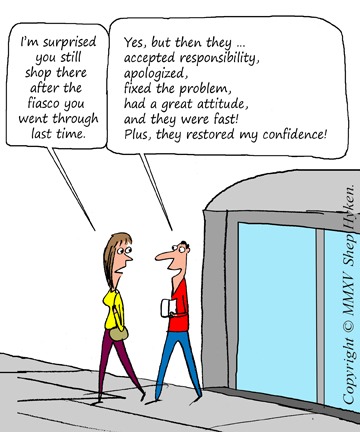 You Can Get More than Tax Advice from TurboTax
You Can Get More than Tax Advice from TurboTax
Recently Intuit, the company that created TurboTax software for individuals to do their own taxes, made a customer service mistake. The good news (See story here.) is that they turned it around and thereby created a great case study for us to learn from.
Here is the short version: In the most recent update of their software, the developers of TurboTax purposely left out a very important feature that had been included in earlier versions. Certain customers who had used TurboTax for years found out in the middle of doing their tax preparation that they would have to pay more to get an upgrade that included the necessary forms for them to complete their return.
The customers affected by the change were upset. So, upset that they went on Amazon.com and other review sites and gave TurboTax a one star rating.
So, how did Intuit react to the uproar?
The first thing they did was apologize. On the Intuit website, which sells TurboTax, an apology was made and an offer to refund $25 to customers who paid extra to file their tax returns. Sason Goodarzi, the general manager of TurboTax made the following statement:
“We messed up. We made a change this year to TurboTax desktop software and we didn’t do enough to communicate this change to you as proactively and broadly as we could or should have. I am very sorry for the anger and frustration we may have caused you.”
Apparently this wasn’t enough. Shortly after the apology on the website, Intuit’s CEO, Brad Smith, posted a video on his LinkedIn account which included the following message: “We’re taking new steps to make things right.” Smith’s heartfelt apology helped.
Intuit had a crisis on their hands. The customer reaction was anger and a loss of loyalty, as customers switched to Intel’s competition, H & R Block. The mistake was that they made a change to a product that some say put profit motive ahead of their customer. Nothing wrong with making a profit, but how you go about it is very important.
So, Intuit had to make a quick move. They did some things right to bring back many of their customers, which we can learn from.
- They acknowledged the problem as they saw the customer comments.
- They apologized for it. Very important whenever there is a mistake. This mistake was big enough that the CEO had to make a public apology, which sent a very positive message.
- They fixed the problem by offering the refunds and upgrades.
- They took accountability. The general manager and CEO’s message was clear that they were taking steps to right the wrong.
- They did it quickly. Their fast reaction convinced many of the customers who were thinking of abandoning the software to stay.
Is it enough? I’m sure that some customers won’t come back, yet many will. The way the problem was handled proved that Intuit listens to their customers. Intuit learned a valuable lesson, and by the way they handled it, so did we.
The five steps mentioned above are exactly how most situations should be handled to not just fix the problem, but restore the customer’s confidence.




It feels like Intuit was fairly reactive here, rather than proactive. Reminds me of BofA’s public faux pas when they threw in new banking fees, or when Netflix raised prices, without first testing the waters with customers. It was Franklin who said that an ounce of prevention is worth a pound of cure. Intuit would be well advised to identify how many customers they lost, and won’t recover, even after this post-facto ‘fix’. They may elect to do things differently next time.
Michael you are exactly right in your assessment. Intuit made a mistake, but I like the way they recovered. Regardless of what caused the problem, eventually they did right buy the customer.
Great piece, Shep! Customers don’t expect you to be perfect, but they do expect you to care–especially when service disappoints. Greatness comes when we respond to service hiccups with humility, empathy, agility and, if appropriate, atonement. The classic example is Dave Carroll (United Breaks Guitars). Over 14M people have watched his famous YouTube video. When I interviewed him for a story, he said that beyond compensating him for the $3500 Taylor guitar they admitted breaking, all he really wanted was for United Airlines to learn from their mistake and fix the system so other travelers would not have a similar experience. Keep up your AMAZING work!
Thanks Chip. Perfect is a goal, not reality. But a nice goal to shoot for, none the less. I love the Dave Carroll example. Dave taught the business world, not just United Airlines, that social media can be a very big platform. Good luck with your new book Sprinkles, which I really enjoyed!